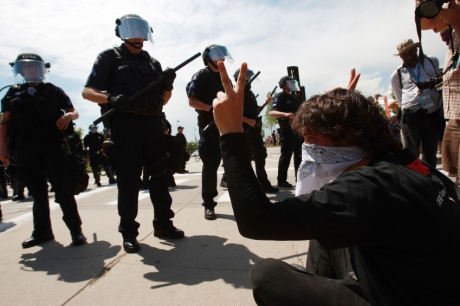Policing of assemblies should be guided by respect for human rights, say participants of OSCE meeting
The importance of policing assemblies in line with human rights standards and OSCE commitments was highlighted at a meeting of more than 30 police officers and civil society representatives from across the OSCE region, in Vienna on 1 and 2 July 2013.

Police stand guard as protesters demonstrate outside the site of the US Democratic Party’s National Convention, Denver, 24 August 2008.
The meeting participants noted the role of police in facilitating the enjoyment and protection of the right to peaceful assembly.
The OSCE Office for Democratic Institutions and Human Rights (ODIHR) presented the findings and recommendations of its report, “Monitoring of Freedom of Peaceful Assembly in Selected OSCE Participating States”, which was published in November 2012 and is based on ODIHR’s observation of 27 assemblies, demonstrations and counter-demonstrations between May 2011 and June 2012.
“This report identifies a number of challenges including the excessive use of force or crowd control tactics, such as kettling, that may unduly restrict the freedom of assembly,” said Snježana Bokulić, the Head of ODIHR’s Human Rights Department. “There are also examples of good practice in some participating States, where, for example, police representatives communicate effectively with organizers of assemblies prior to, and during the events.”
“Relevant state institutions have an obligation to design operating plans and procedures that facilitate the exercise of the right to freedom of peaceful assembly,” said Robert Hampshire, a police expert from the OSCE Transnational Threats Department. “The policing of assemblies must be guided by the human rights principles of legality, necessity, proportionality, accountability and non-discrimination.”
Bokulić and Hampshire underscored the OSCE’s readiness to assist national police forces, upon request, in ensuring the respect for human rights in the policing of assemblies.
Source: Organization for Security and Co-operation in Europe
- 502 reads
Human Rights
Fostering a More Humane World: The 28th Eurasian Economic Summi

Conscience, Hope, and Action: Keys to Global Peace and Sustainability

Ringing FOWPAL’s Peace Bell for the World:Nobel Peace Prize Laureates’ Visions and Actions

Protecting the World’s Cultural Diversity for a Sustainable Future

Puppet Show I International Friendship Day 2020

